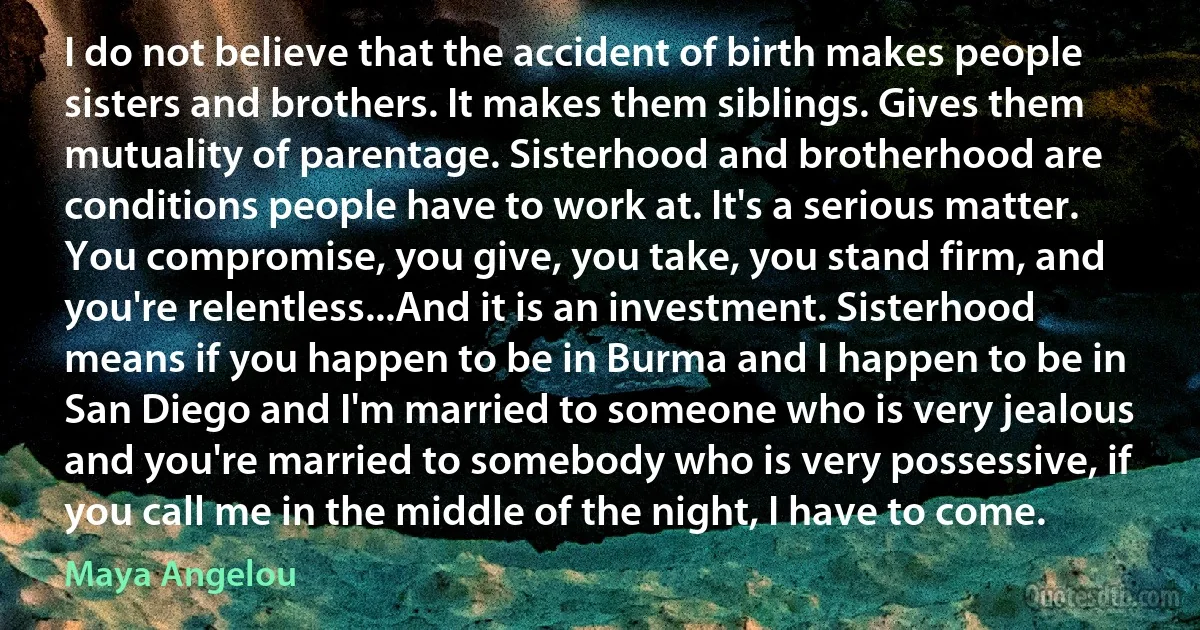Parentage Quotes
It is an established maxim that birth is a criterion of allegiance. Birth however derives its force sometimes from place and sometimes from parentage, but in general place is the most certain criterion; it is what applies in the United States; it will therefore be unnecessary to investigate any other.

James Madison
Men of mixed blood in this country apply the name 'negro' to themselves, not because it is a correct ethnological description, but to seem especially devoted to the black side of their parentage. Hence in some cases they are more noisily opposed to the conclusion to which I have come, than either the white or the honestly black race. The opposition to amalgamation, of which we hear so much on the part of colored people, is for most part the merest affectation, and, will never form an impassable barrier to the union of the two varieties.

Frederick Douglass
I plan to vote for Barack Obama in the Pennsylvania primary because he is a rational, centered personality who speaks the language of idealism and national unity. Obama has served longer as an elected official than Hillary. He has had experience as a grass-roots activist, and he is also a highly educated lawyer who will be a quick learner in office. His international parentage and childhood, as well as his knowledge of both Christianity and Islam, would make him the right leader at the right time. And his wife Michelle is a powerhouse. The Obamas represent the future, not the past.

Camille Paglia
Wisdom, if it were young, would cherish love, nursing it with devotion, deepening it with sacrifice, vitalizing with parentage, making all things subordinate to it till the end. Even though it consumes us in its service and overwhelms us with tragedy, even though it breaks us down with separations, let it be first. How can it matter what price we pay for love?

Will Durant
If, in spite of the fact that all these attributes have been faithfully handed down unaltered for hundreds of generations, we are to believe that, in the course of time, they have all diverged from one common stock, how shall we resist the arguments of the transmutationist, who contends that all closely allied species of animals and plants have in like manner sprung from a common parentage, albeit that for the last three or four thousand years they may have been persistent in character?

Charles Lyell
[The Hoare-Laval proposals] were not so frightfully different from those put forward by the Committee of Five [of the League of Nations]. But the latter were of respectable parentage: and the Paris ones were too much like the off-the-stage arrangements of nineteenth-century diplomacy.

Edward Wood, 1st Earl of Halifax
The slave-owner is at times visited with a nightmare. He finds that his free will, in spite of its freedom, is thwarted, not by a superior will but by things-in-themselves – by inferior wills, accidents, mistakes, and his own ignorance. Yet he is still unable to conceive his will except as being thwarted like that of his slave's by another will, and since he the master is so thwarted, might not even the world's master and his – God Himself – be thwarted in his volition by some grand over-riding will, by Will-in-Itself? This is the slaveowning conception of Moira, or Fate, a comparatively late development reaching its noblest expression in Greek tragedy. This Fate, in spite of its closeness to bourgeois determinism, betrays its slave-owning parentage by the fact that it is always visualised as a consciously forseeing Will, and always as thwarting, not determining human wills as well as events, but interfering with human wills by means of events.

Christopher Caudwell
This study partitions the total variance in rate of return among FTC Line of Business reporting units into industry factors (whatever their nature), time factors, factors associated with the corporate parent, and business-specific factors. Whereas Schmalensee (1985) reported that industry factors were the strongest, corporate and market share effects being extremely weak, this study distinguishes between stable and fluctuating effects and reaches markedly different conclusions. The data reveal negligible corporate effects, small stable industry effects, and very large stable business-unit effects. These results imply that the most important sources of economic rents are business-specific; industry membership is a much less important source and corporate parentage is quite unimportant.

Richard Rumelt
The circumstance-adaptive law, operating upon the slight but continued natural disposition to sport in the progeny (seedling variety), does not preclude the supposed influence which volition or sensation may have over the configuration of the body. To examine into the disposition to sport in the progeny, even when there is only one parent, as in many vegetables, and to investigate how much variation is modified by the mind or nervous sensation of the parents, or of the living thing itself during its progress to maturity; how far it depends upon external circumstance, and how far on the will, irritability and muscular exertion, is open to examination and experiment. In the first place, we ought to investigate its dependency upon the preceding links of the particular chain of life, varieties being often merely types or approximations of former parentage; thence the variation of the family, as well as of the individual, must be embraced by our experiments.

Patrick Matthew
What are the ingredients of the most creatively meaningful image of human existence that the mind can conceive? Remove human frailty--as grass, as a sigh, as dust, as moth-crushed--and the estimate becomes romantic. Remove grandeur--a little lower than God--and aspiration recedes. Remove sin-the tendency to miss the mark--and sentimentality threatens. Remove freedom--choose ye this day!--and responsibility goes by the board. Remove, finally, divine parentage and life becomes estranged, cut loose and adrift on a cold, indifferent sea. With all that has been discovered about human life in the intervening 2,500 years, it is difficult to find a flaw in this assessment.

Huston Smith
Day, night, late, early,
At home, abroad, alone, in company,
Waking or sleeping, still my care hath been
To have her match'd; and having now provided
A gentleman of princely parentage,
Of fair demesnes, youthful, and nobly train'd,
Stuff'd, as they say, with honourable parts,
Proportion'd as one's thought would wish a man-
And then to have a wretched puling fool,
A whining mammet, in her fortune's tender,
To answer 'I'll not wed, I cannot love;
I am too young, I pray you pardon me'!

William Shakespeare



